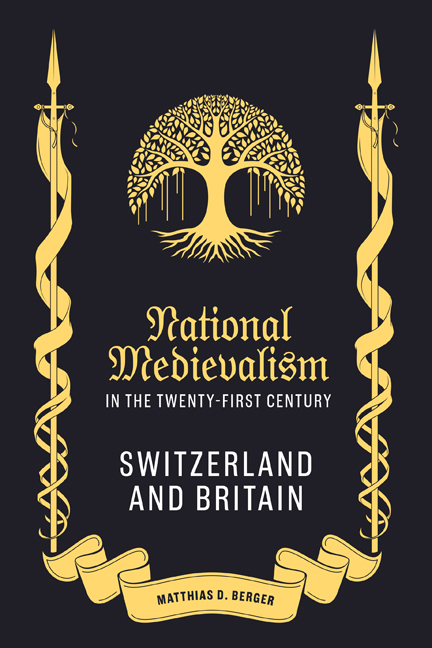Book contents
- Frontmatter
- Dedication
- Contents
- List of Illustrations
- Acknowledgements
- Author’s Note
- List of Abbreviations
- Introduction
- 1 Constructing Continuity: Four Nations Imagine Their Beginnings
- Part I The Politics of Autochthony
- 2 For Freedom Alone: The Scottish Independence Referendum
- 3 2016 and All That: Brexit
- 4 Freiheit statt Vögte: The Swiss National-Conservatives
- Part II The Others of National Medievalism
- 5 Masculine Middle Ages: Gender
- 6 In Strange Lands: Race, Ethnicity, Immigration
- Conclusion: The Demands of the Past
- Afterword: National Medievalism in the Age of COVID-19
- Bibliography
- Index
- Medievalism
Part II - The Others of National Medievalism
Published online by Cambridge University Press: 17 December 2023
- Frontmatter
- Dedication
- Contents
- List of Illustrations
- Acknowledgements
- Author’s Note
- List of Abbreviations
- Introduction
- 1 Constructing Continuity: Four Nations Imagine Their Beginnings
- Part I The Politics of Autochthony
- 2 For Freedom Alone: The Scottish Independence Referendum
- 3 2016 and All That: Brexit
- 4 Freiheit statt Vögte: The Swiss National-Conservatives
- Part II The Others of National Medievalism
- 5 Masculine Middle Ages: Gender
- 6 In Strange Lands: Race, Ethnicity, Immigration
- Conclusion: The Demands of the Past
- Afterword: National Medievalism in the Age of COVID-19
- Bibliography
- Index
- Medievalism
Summary
I have argued that the Middle Ages are attractive for statements of national identity because they offer conceptual ‘localness’ and connotations of transhistorical national particularity and exceptionalism. The national Middle Ages have recently been championed in response to a set of connected international developments. Firstly – and I have foregrounded this in my introduction – this is a reaction to the oft-declared weakening of the nation-state at the hands of the economic and political drivers of globalisation. Secondly, it reflects increasingly negative perceptions of international migration and the cultural and racial diversification which it brings in its wake. This reaction to immigration and ‘multiculturalism’ is, thirdly, part of a wider culture war waged most acrimoniously, albeit with different emphases, in the US and across Europe. In addition to multiculturalism, disputes revolve around such social issues as gender equality, reproductive rights and LGBT rights, with right-wing populist discourse lamenting ‘political correctness’ and ‘wokeness’, which supposedly disseminate totalitarian ideas of feminism, queer liberation and racial justice.
It is with a view to such issues that, increasingly, reactionary political and cultural actors invoke the supposed golden age of a harmonious and homogeneous earlier society to support their respective agendas. Obviously, not all variant nationalist interpretations of the deep past subscribe to ideas of a wholly unchanging national identity. Yet nationalism is programmatically at pains to present itself as timeless and natural. To the degree that they embrace essentialism, genealogical medievalism and the grand narratives it inhabits produce some of the most monolithic conceptions of collective identity. All the while, conservative national medievalism performs a paradoxical balancing act between, on the one hand, downplaying outside influences in the history of the nation and glossing over ruptures and false starts (which in this interpretation are able only to retard, not change, the national essence) and, on the other hand, exaggerating outside influences to suggest that a diversifying nation is a nation threatened in its essence.
By definition, identity is exclusive and reciprocally related to non-identity.3 In-groups are set apart not only from, but also by, out-groups, which they therefore have an interest in maintaining. Other nations as competitors and aggressors to be fended off are near-ubiquitous in the national medievalisms I have discussed up to this point.
- Type
- Chapter
- Information
- National Medievalism in the Twenty-First CenturySwitzerland and Britain, pp. 139 - 142Publisher: Boydell & BrewerPrint publication year: 2023

